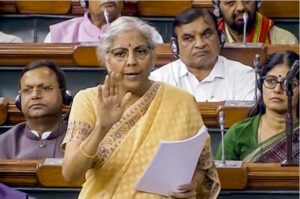Union Minister Nirmala Sitharaman has approved Banking Amendment Bill 2024 : allows 4 nominees in bank accounts
On December 3, 2024, Union Finance Minister Nirmala Sitharaman introduced a significant Banking Laws (Amendment) Bill during the ongoing winter session of Parliament. The Bill proposes crucial reforms in the banking sector, aiming to enhance governance, safeguard customer interests, and modernize outdated banking laws. India’s banking landscape, transformed since the nationalization of banks in 1969, continues to evolve, with earlier reforms including the Narasimha Committee’s recommendations and the establishment of entities like the Bad Bank.

The new Bill is designed to improve security for depositors and investors, reduce legal complexities, and expedite processes for the distribution of funds to nominees, especially in light of challenges faced during the pandemic. Additionally, the Bill suggests increasing the number of nominees for bank accounts, addressing issues like inheritance and estate distribution that have caused difficulties for families in the past. The ultimate goal of the amendment is to further instill public confidence in the banking system, offering better protection for funds and improving access to banking services across the nation.
Finance Minister Sitharaman highlighted that since 2014, the government and the Reserve Bank of India (RBI) have worked tirelessly to ensure stability and growth in the banking sector. The result of these efforts is evident, as public sector banks are currently profitable, and banking services are more accessible to the general public. This latest amendment represents a continuation of these efforts, focusing on enhancing banking operations and providing more robust safeguards for depositors and investors.
Key points of the Bill
One significant provision in the Banking Laws (Amendment) Bill is related to nominees. When opening a bank account, account holders typically designate a nominee, such as a parent, spouse, or sibling. However, during the COVID-19 pandemic, many families faced difficulties when both the account holder and nominee passed away. The new law allows up to four nominees for an account, and it offers two methods for distributing funds: successive (one after another) or simultaneous (equally among all). Notably, the “simultaneous” method doesn’t apply to locker contents, which must follow the “successive” order.
Additionally, unclaimed shares and deposits will be transferred to the Investor Protection Fund (IPF), which will use the funds for education and social welfare projects. If anyone later claims the shares, they will be refunded from the IPF.
Also the new law includes a change in the definition of “substantial interest” in banks. Previously, the threshold for substantial interest was set at ₹5 lakh in 1968, which was considered significant at the time but is now outdated. The law now raises this amount to ₹2 crore after 60 years. Another key change involves directors of central cooperative banks, who can now also work with state cooperative banks, and their tenure has been extended from 8 to 10 years (excluding presidents and full-time directors).
Furthermore, the law provides for improved bank audits with qualified personnel and changes in reporting deadlines to the RBI. A significant amendment also addresses the fortnightly cycle for Cash Reserve Ratio (CRR) and Statutory Liquidity Ratio (SLR), simplifying the process to two cycles per month. Though the bill has faced some opposition, it is expected to bring crucial improvements to the banking sector, ultimately benefiting customers.







